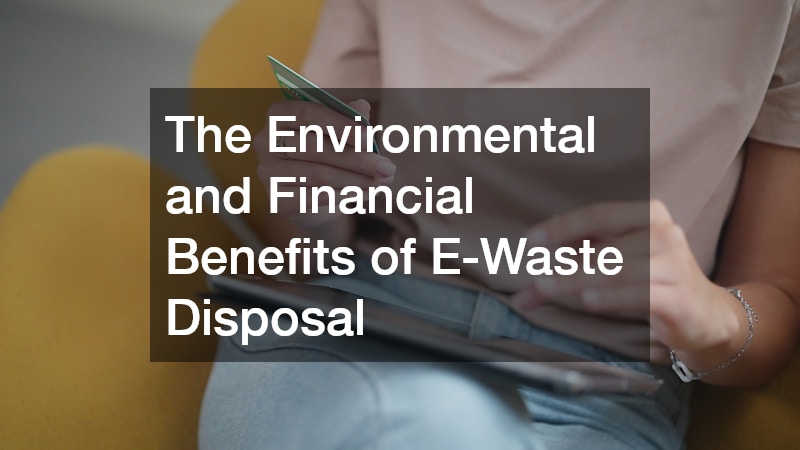Disclaimer: Computers and Technology News Digest. This site provides computers and technology content for informational purposes only.
Electronic waste, or e waste, is an escalating problem worldwide, with significant implications for both the environment and the economy. Proper disposal and recycling of e waste can lead to substantial environmental and financial benefits. This article delves into the key questions surrounding e waste disposal services, exploring their advantages and potential impacts.
The Growing Concern of Toxic Materials
Improper e waste disposal can result in the release of toxic substances such as lead, mercury, and cadmium into the environment, leading to potential health risks for both humans and wildlife. The contamination of soil and water by these hazardous materials is a significant concern, as it can result in long-term adverse effects on living organisms and ecosystems.
There are growing calls for stronger regulations and better e waste management practices worldwide to mitigate these environmental threats.
When discarded improperly, electronic devices can leak harmful chemicals into the earth, thus degrading soil quality and affecting plant life that is crucial for ecological balance. Additionally, toxic chemicals from decomposing e waste can seep into the groundwater, which can then flow into rivers and lakes, exacerbating water pollution concerns. The impact of e waste on biodiversity can also be profound, as toxins can accumulate in the food chain, ultimately affecting human health.
Effective e waste disposal requires international cooperation and comprehensive policies to tackle the transboundary movement of these hazardous materials. By ensuring that e waste is collected and processed in environmentally responsible ways, the potential for environmental degradation can be minimized, which will help preserve natural habitats and protect various species. Efforts to educate the public on responsible e waste disposal are also crucial in stemming the tide of pollution stemming from improper e waste management.
Resource Recovery and Cost Efficiency
Recycling e waste allows for the retrieval of valuable materials like gold, silver, and copper, reducing the need for new raw materials and consequently conserving natural resources. By recovering these materials from old electronics, manufacturers can reduce the demand on mining activities that often lead to environmental degradation. This process is not only environmentally beneficial but also economically viable as it reduces production costs and raw material expenses.
In addition to lowering the environmental impact of mining operations, recycling e waste contributes to more sustainable industrial practices by fostering a circular economy where products and materials are kept in use for as long as possible. The recycling process promotes innovation in material processing technologies, which can lead to improved efficiency and quality of recycled products. This intricately linked cycle supports sustainable development by aligning economic growth with environmental stewardship.
Engaging in e waste recycling also stimulates various economic sectors, ranging from electronics manufacturing to waste management industries. By diverting e waste from landfills to recycling facilities, we not only decrease landfill use but also create new job opportunities in these facilities. Furthermore, government incentives and regulations aimed at promoting e waste recycling can spur investment in new technologies and infrastructure, thereby enhancing the overall economic landscape.
Job Creation and Business Growth
The e waste management industry presents significant economic opportunities, including job creation in recycling facilities and the growth of businesses specializing in e waste collection and processing. As awareness about the importance of e waste recycling grows, so too does the potential for economic expansion within this sector. The establishment of specialized e waste recycling centers can breathe new life into local economies by creating skilled jobs and fostering entrepreneurship.
With regulations on e waste disposal becoming stricter, there is a growing demand for skilled professionals who can effectively handle and process electronic waste. This demand paves the way for training and development programs that equip individuals with the necessary skills to succeed in the e waste management industry. Additionally, technological advancements in recycling methods continue to improve both the efficiency and effectiveness of e waste processing, which further supports business growth and job creation.
By embracing the economic opportunities provided by e waste management, businesses and governments can work together to build a sustainable future. Through strategic investments and public-private partnerships, the expansion of recycling infrastructure has the potential to generate substantial economic benefits. These collaborative efforts not only enhance resource recovery and waste reduction but also contribute to a greener, more sustainable economy, ultimately supporting long-term societal prosperity.
The proper disposal and management of e waste present substantial benefits both environmentally and financially. By addressing the challenges and leveraging the opportunities in e waste recycling, society can mitigate ecological harm and realize significant economic gains. These efforts are essential for fostering a more sustainable and economically viable future.
.


